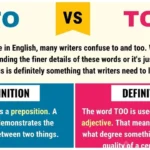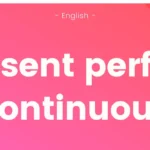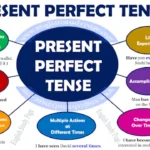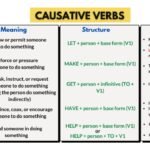Question Tag In Hindi, Definition: Question tag is an art of making a question + acceptance.
(प्रश्न टैग प्रश्न + स्वीकृति बनाने की एक कला है।)
Example: Ram is a dancer, isn’t he?- राम एक नर्तक है, है ना?
A question tag sentence has two parts in uses-
(i) Statement
(ii) Question
Example: Ram is a Dancer, isn’t he? (Ram is a dancer = Statement & Isn’t he? = Question)
Some Facts
(i) किसी Question tag sentence का समापन Question mark (?) से होता हैं|
(ii) किसी Question tag sentence के Question part का शुरुआत Small letter से होता हैं|
(iii) किसी Question tag sentence का Question part Interrogative रहने पर Auxiliary Verb + not का short form आना चाहिए|
(iv) किसी Question tag sentence के Question part का Subject noun स्वरुप में नही आता, इसे Statement part के Subject के अनुशार Pronoun स्वरुप में आता है|
Examples :
- You are coming, aren’t you?- तुम आ रहे हो, नहीं?
- She doesn’t like coffee, does she?- उसे कॉफ़ी पसंद नहीं है, क्या?
- They haven’t finished yet, have they?- उन्होंने अभी तक समाप्त नहीं किया है, क्या?
- He won’t mind, will he? -उसे परवाह नहीं होगी, क्या?
- You’ve been to Paris, haven’t you?- तुम पेरिस गए थे, नहीं?
- She can speak French, can’t she?- वह फ्रेंच बोल सकती है, नहीं?
- They shouldn’t be late, should they?-वे देर से नहीं आना चाहिए, क्या?
- He didn’t call you, did he? -उसने तुम्हें कॉल नहीं किया, क्या?
- You’ve finished your homework, haven’t you? – तुमने अपना होमवर्क पूरा कर लिया है, नहीं?
- She won’t forget to come, will she? – वह आने भूलेगी नहीं, क्या?
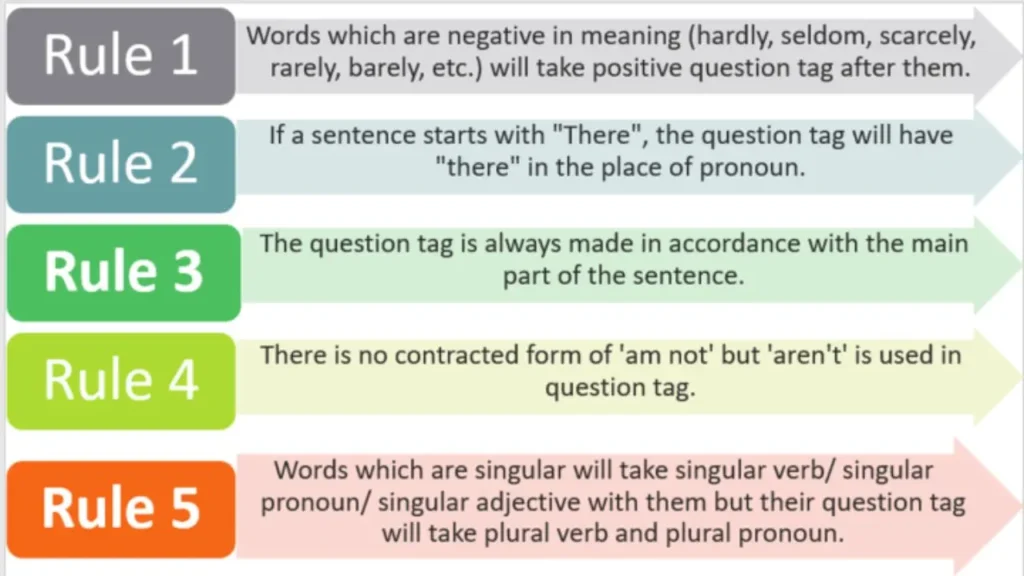
18 Rule & Uses
Rule 1.
[1.] If the statement part of a question tag sentence is affirmative, the question part is written interrogatives. (यदि प्रश्नवाचक वाक्य का कथन भाग सकारात्मक है, तो प्रश्नवाचक भाग को प्रश्नवाचक लिखा जाता है।)
[Affirmative statement], [negative interrogative tag]?
: [सकारात्मक वाक्य], [नकारात्मक प्रश्नवाचक टैग]?
Example:
- English: She is coming to the party, isn’t she?- वह पार्टी में आ रही है, है ना?
- English: They are friends, aren’t they?- वे दोस्त हैं, हैं ना?
- English: You can swim, can’t you?- तुम तैर सकते हो, क्या नहीं?
- English: He loves music, doesn’t he?- उसे संगीत पसंद है, है ना?
- English: Ram is a dancer, isn’t he?- राम एक नर्तक है, है ना?
Rule 2.
[2.] If the statement part of a question tag sentence is negative, the question part is written interrogative of a negative. (यदि प्रश्नवाचक वाक्य का कथन भाग नकारात्मक है, तो प्रश्न भाग को नकारात्मक के प्रश्नवाचक रूप में लिखा जाता है।)
[Negative statement], [positive interrogative tag]?
[नकारात्मक वाक्य], [सकारात्मक प्रश्नवाचक टैग]?
Example:
English: Ram is not a dancer, is he?- राम नर्तक नहीं है, है ना?- English: She isn’t coming to the party, is she?- वह पार्टी में नहीं आ रही है, है ना?
- English: They aren’t friends, are they?- वे दोस्त नहीं हैं, हैं ना?
- English: You can’t swim, can you?- तुम तैर नहीं सकते, क्या तुम कर सकते हो?
- English: He doesn’t love music, does he?- उसे संगीत पसंद नहीं है, है ना?
Rule 3.
[3.] This/that as the subject of a statement part is change into ‘it’ is question part.(कथन भाग के विषय के रूप में यह/वह प्रश्न भाग में ‘यह’ में बदल जाता है।)
: [This/That statement], [isn’t it]?
: [यह/वह वाक्य], [है ना]?
Examples:
This is a new car, isn’t this? (x) / This is a new car, isn’t it? (✓)
English: This is a new car, isn’t it?
Hindi: यह नई कार है, है ना?- English: That is your book, isn’t it?
Hindi: वह तुम्हारी किताब है, है ना? - English: This is the problem, isn’t it?
Hindi: यह समस्या है, है ना? - English: That was a great movie, wasn’t it?
Hindi: वह शानदार फिल्म थी, है ना? - English: This is a big mistake, isn’t it?
Hindi: यह बड़ी गलती है, है ना?
Rule 4.
[4.] This/that + noun as the subject of a statement part gets pronoun in question part according to the noun. (यह/वह + संज्ञा कथन भाग के विषय के रूप में प्रश्न भाग में संज्ञा के अनुसार सर्वनाम बन जाती है।)
[This/That + noun statement], [pronoun + isn’t/aren’t + it]?
[यह/वह + संज्ञा वाक्य], [सर्वनाम + है ना]?
Example:
This boy is honest, isn’t he? / This girl honesty, isn’t she? / This pen is red, isn’t it?
- English: This boy is honest, isn’t he?
- Hindi: यह लड़का ईमानदार है, है ना?
- English: That girl is smart, isn’t she?
- Hindi: वह लड़की चालाक है, है ना?
- English: This pen is red, isn’t it?
- Hindi: यह कलम लाल है, है ना?
- English: That dog is barking, isn’t it?
- Hindi: वह कुत्ता भौंक रहा है, है ना?
- English: This house is big, isn’t it?
- Hindi: यह घर बड़ा है, है ना?
Rule 5.
[5.] These/those of a subject of a statement part is changing to ‘they’ is question part. (कथन भाग में विषय के ‘ये’/’वे’ को प्रश्न भाग में ‘वे’ में बदल दिया जा रहा है।)
English: [These/Those statement], [aren’t they]?
Hindi: [ये/वे वाक्य], [है ना]?
Examples:
These are new car, aren’t these? (x) / These are new car, aren’t they? (✓)
English: These are new cars, aren’t they?
Hindi: ये नई कारें हैं, है ना?- English: Those are your books, aren’t they?
Hindi: वे तुम्हारी किताबें हैं, है ना? - English: These are my friends, aren’t they?
Hindi: ये मेरे दोस्त हैं, है ना? - English: Those are beautiful flowers, aren’t they?
Hindi: वे सुंदर फूल हैं, है ना? - English: These are the results, aren’t they?
Hindi: ये परिणाम हैं, है ना?
Rule 6.
[6.] …of us/…of you/…of them etc as the subject of statement part are changed into we/you/they in question part. (कथन भाग के विषय के रूप में हम/…आप/…उनमें से आदि को प्रश्न भाग में हम/आप/वे में बदल दिया जाता है)
: [Statement with …of us/…of you/…of them], [aren’t we/you/they]?
: [हममें से … / तुममें से … / उनमें से … वाक्य], [है ना]?
Example:
- Some of us are very intelligent, aren’t we?
- English: Some of us are very intelligent, aren’t we?
Hindi: हममें से कुछ बहुत बुद्धिमान हैं, है ना? - English: All of you are ready, aren’t you?
Hindi: तुम सब तैयार हो, है ना? - English: Most of them are here, aren’t they?
Hindi: उनमें से अधिकांश यहाँ हैं, है ना? - English: None of us can dance, can we?
Hindi: हममें से कोई भी नाच नहीं सकता, क्या हम कर सकते हैं? - English: Few of you know the truth, don’t you?
Hindi: तुममें से कुछ ही सच जानते हैं, है ना?
Rule 7.
[7.] If the statement part of a question tag a sentence has subject i, verb am and written aren’t i.- यदि किसी प्रश्न टैग के कथन भाग में विषय i, क्रिया am है और लिखा है are’t i. कथन
: [I am statement], [aren’t I]?
: [मैं हूँ वाक्य], [है ना]?
Example:
I am going to Delhi, amn’t i? (x) / I am going to Delhi, aren’t i? (✓)
English: I am going to Delhi, aren’t I?
Hindi: मैं दिल्ली जा रहा हूँ, है ना?- English: I am your friend, aren’t I?
Hindi: मैं तुम्हारा दोस्त हूँ, है ना? - English: I am the best candidate, aren’t I?
Hindi: मैं सबसे अच्छा उम्मीदवार हूँ, है ना? - English: I am in the team, aren’t I?
Hindi: मैं टीम में हूँ, है ना? - English: I am right, aren’t I?
Hindi: मैं सही हूँ, है ना?
Rule 8.
[8.] If the statement part of a question tag a sentence has subject i, verb am and sentence is negative, the question part is written am i.-यदि प्रश्न वाले वाक्य के कथन भाग में विषय i, क्रिया am हो तथा वाक्य नकारात्मक हो, तो प्रश्न भाग am i लिखा जाता है।
[I am not statement], [am I]?
[मैं नहीं हूँ वाक्य], [हूँ क्या]?
Examples:
English: I am not going to Delhi, am I?
Hindi: मैं दिल्ली नहीं जा रहा हूँ, हूँ क्या?- English: I am not your friend, am I?
Hindi: मैं तुम्हारा दोस्त नहीं हूँ, हूँ क्या? - English: I am not the best candidate, am I?
Hindi: मैं सबसे अच्छा उम्मीदवार नहीं हूँ, हूँ क्या? - English: I am not in the team, am I?
Hindi: मैं टीम में नहीं हूँ, हूँ क्या? - English: I am not right, am I?
Hindi: मैं सही नहीं हूँ, हूँ क्या? - I am not going to Delhi, am i?
Rule 9.
[9.] If the statement parts of a question tag sentence has subject i, verb was and sentence affirmative, the question part is written weren’t i. (यदि प्रश्न टैग वाक्य के कथन भाग में विषय i, क्रिया was और वाक्य नकारात्मक है तो प्रश्न भाग was i लिखा जाता है)
[I was statement], [weren’t I]?
: [मैं था वाक्य], [है ना]?
Examples:
I was a dancer, wasn’t i? (x) / I was a dancer, weren’t i? (✓)
English: I was a dancer, weren’t I?
Hindi: मैं एक नर्तक था, है ना?- English: I was your best friend, weren’t I?
Hindi: मैं तुम्हारा सबसे अच्छा दोस्त था, है ना? - English: I was in the
Rule 10.
[10.] If the statement part of a question tag sentence has subject i, verb was and sentence negative the question part is written was i.- यदि प्रश्न टैग वाक्य के कथन भाग में विषय i, क्रिया was और वाक्य नकारात्मक है तो प्रश्न भाग was i लिखा जाएगा।
Example:
I was not tired, was I?
Hindi: मैं थका हुआ नहीं था, था ना?
- I was not a dancer, was i?
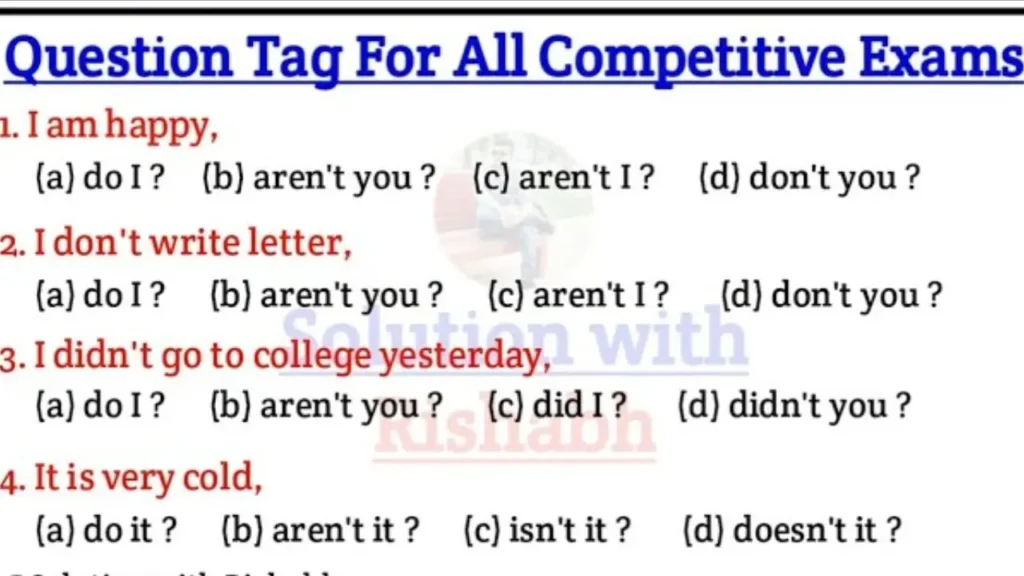
Rule 11.
[11.] A statement part without auxiliary verb makes question park with the help of help of do/does/did. 9सहायक क्रिया के बिना कथन भाग do/does/did की सहायता से प्रश्न पार्क बनाता है।)
Examples:
I play cricket, don’t I?
Hindi: मैं क्रिकेट खेलता हूँ, है ना?
She likes coffee, doesn’t she?
Hindi: वह कॉफी पसंद करती है, है ना?
You went to the market, didn’t you?
Hindi: तुम बाजार गए थे, है ना?
They live in Delhi, don’t they?
Hindi: वे दिल्ली में रहते हैं, है ना?
He works hard, doesn’t he?
Hindi: वह कड़ी मेहनत करता है, है ना?- I play cricket, don’t i?
Rule 12.
[12.] यदि need, dare तथा do वाक्य में Auxiliary Very का काम करे तो ये अपना Question part स्यंग तैयार करते हैं| यदि यह main verb का काम करे तो Question part do/does/did के सहारे बनाया जाता|
Example:
I did not buy a car, need i? (✓) / I need to buy a car, don’t i? (✓)
- I did not buy a car, need I?- मैंने कार नहीं खरीदी, क्या मुझे चाहिए?
- I need to buy a car, don’t I?: मुझे कार खरीदनी है, है ना?
- She dared to speak, didn’t she?: उसने बोलने की हिम्मत की, है ना?
- You do your homework, don’t you?: तुम अपना होमवर्क करते हो, है ना?
- He doesn’t need help, does he?: उसे मदद की ज़रूरत नहीं है, है ना?
[13.] Order- आदेश
Statement part: V1 + object
Question part: will you/won’t you
Examples:
- Bring a chair for me, will you?
- Hindi: मेरे लिए एक कुर्सी लाओ, क्या तुम लाओगे?
- Open the window, won’t you?
- Hindi: खिड़की खोलो, क्या तुम खोलोगे?
- Pass the salt, will you?
- Hindi: नमक पास करो, क्या तुम पास करोगे?
- Clean the room, won’t you?
- Hindi: कमरा साफ करो, क्या तुम साफ करोगे?
- Close the door, will you?
- Hindi: दरवाजा बंद करो, क्या तुम बंद करोगे?
- Bring a chair for me, will you?
[14.] Advice- सलाह
Statement part: V1 + object
Question part: should you/shouldn’t you
Examples:
- Take regular exercise for good health, should you?
- Hindi: अच्छी सेहत के लिए नियमित व्यायाम करो, क्या तुम करोगे?
- Drink more water, shouldn’t you?
- Hindi: अधिक पानी पियो, क्या तुम नहीं पियोगे?
- Eat more vegetables, should you?
- Hindi: अधिक सब्जियां खाओ, क्या तुम खाओगे?
- Sleep early, shouldn’t you?
- Hindi: जल्दी सोओ, क्या तुम नहीं सोओगे?
- Read daily, should you?
- Hindi: रोज पढ़ो, क्या तुम पढ़ोगे?
Example: Take a regular exercise for good health, should you.
[15.] Reqest (अनुरोध
Statement part: Please + kindly + V1 + object
Question part: will you/won’t you
Examples:
- Hindi: कृपया मेरी मदद करो, क्या तुम करोगे?
- Kindly pass the book, won’t you?
- Hindi: कृपया किताब पास करो, क्या तुम करोगे?
- Please call me, will you?
- Hindi: कृपया मुझे फोन करो, क्या तुम करोगे?
- Kindly open the door, won’t you?
- Hindi: कृपया दरवाजा खोलो, क्या तुम खोलोगे?
- Please come here, will you?
- Hindi: कृपया यहाँ आओ, क्या तुम आओगे?
[16.] Prohibition (निषेध / बाधा / रोक)
Statement part: Don’t/never + V1 + object
Question part: will you
Examples:
- Don’t touch this wire, will you?: इस तार को मत छुओ, क्या तुम छुओगे?
- Never speak to me like that, will you?: मुझसे इस तरह कभी बात मत करो, क्या तुम करोगे?
- Don’t enter the room, will you?: कमरे में मत जाओ, क्या तुम जाओगे?
- Never lie to me, will you?: मुझसे कभी झूठ मत बोलो, क्या तुम बोलोगे?
- Don’t eat that, will you?: उसे मत खाओ, क्या तुम खाओगे?
Don’t touch this wire, will you?
[17.] Wish / Proposal (प्रस्ताव / सुझाव)
Statement part: Let + object + V1
Question part: shall we/shall he
Examples:
- Let us play cricket, shall we?
- Hindi: चलो क्रिकेट खेलते हैं, क्या हम खेलेंगे?
- Let him speak, shall he?
- Hindi: उसे बोलने दो, क्या वह बोलेगा?
- Let us go for a walk, shall we?
- Hindi: चलो टहलने चलते हैं, क्या हम चलेंगे?
- Let her join us, shall she?
- Hindi: उसे हमारे साथ शामिल होने दो, क्या वह शामिल होगी?
- Let them try, shall they?
- Hindi: उन्हें कोशिश करने दो, क्या वे कोशिश करेंगे?
Let us play cricket, shall he?
Rule 18
[18] कुछ word अपने आप में ही अपना sense negative रखते हैं| अत: इनकी उपस्तिथि statement part में देखे तो इनका Question part interrogative affirmative होना चाहिए|
( Hardly, Scarcely, Rarely, Seldom, No, Not, Never, Neither, None, No sooner, No one, Nobody, Nothing, Parley, Few, Little etc. )
Examples:
- She hardly works, does she?- वह मुश्किल से काम करती है, है ना?
He never lies, does he?- वह कभी झूठ नहीं बोलता, है ना?
They seldom visit, do they?- वे कभी-कभी ही आते हैं, है ना?
I have no money, do I?- : मेरे पास पैसे नहीं हैं, है ना?
She rarely eats out, does she?- : वह शायद ही कभी बाहर खाती है, है ना?
He could hardly solve this question, couldn’t he? (x) / He could hardly solve this question, could he? (✓)
Read Also:

